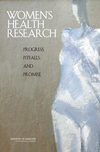Even though slightly more than half the U.S. population is female, medical research historically has neglected to address medical management as pertains specifically to women, such as screening protocols and medication dosages. While we’ve seen advances in support of women’s health research—in policies, regulations, and research efforts-over the past 20 years, the IOM examined lessons learned from the research findings, and assessed how well the newly gained knowledge has been put into practice as well as communicated to both providers and women. In brief, the findings suggest significant progress has been made in lessening the burden of disease and reducing deaths from some conditions, but only moderate to little or no change for many other conditions. Significant gaps remain, and given the varied roles women play in society, continuing to support research that considers sex and gender differences, and then applies the findings to practice, are essential for our nation as a whole.
IOM Assessment of Women’s Health Research: Progress, Pitfalls, and Promise
0
To achieve optimal health, it is in the nation’s best interest to consider sex and gender differences in all relevant research, and to apply findings in clinical practice, according to the Institute Of Medicine (IOM) Report on Women’s Health Research: Progress, Pitfalls and Promise, published in 2010. The findings support the need to bring sex and gender focused resources to every medical institution and practicing health professional if we are to achieve the best health outcomes for women. This is the mission of the Sex & Gender Women’s Health Collaborative

